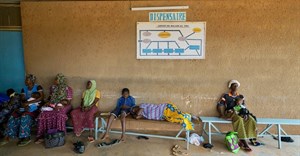
Alzheimer's needs to be recognised as chronic disease
"Alzheimer's affects thousands of families every year with devastating results. In spite of this, most South African medical aids do not recognize it as a chronic illness," says Alzheimer's SA regional director Jill Robson. There are currently some 750 000 people in South Africa who have the disease, with many facing financial ruin as a result.
Alzheimer's disease is a progressive and terminal illness with no cure. It generally affects people 65 years of age and older, and sufferers need full-time care when the disease reaches advanced stages. In addition to the emotional trauma that the families of sufferers go through, there is the cost of care and drugs to treat the symptoms.
According to Robson, it also makes treating other diseases more expensive. "Most people with Alzheimer's have one or more other serious medical conditions. Dementia complicates management of these conditions. Many Alzheimer's sufferers do not have an identifiable caregiver, which exposes them to higher risks such as inadequate self-care, malnutrition and untreated medical conditions.
"New research from the US also suggests that chronic and often severe stress associated with dementia caregiving may exert substantial risk for the development of dementia in spouse caregivers."
Paying for care is difficult, as Alzheimer's disease is not listed as a chronic disease, which leaves sufferers incapable of accessing the much-needed support of their medical aid. By definition, a chronic condition is an ailment that has to be treated on an ongoing basis for more than three months. The chronic disease list is a regulated compilation of 25 life-threatening conditions requiring treatment for over 12 months and which may not be excluded by medical schemes. Alzheimer's is not one of them.
Alzheimer's in Action hopes to change the situation and has launched a lobbying website, as a call to action. The site was launched to try and persuade government to persuade the medical aids to include Alzheimer's disease in their future planning. "We would like them to pay for day and respite care and to treat the disease as a chronic condition, paying for the medication on chronic. We want Alzheimer's and the other dementias treatment to be included in the list of Prescribed Minimum Benefits. If conditions are included in the list, medical aids have to pay for them."
Alzheimer's in Action is encouraging people to go to the website and sign the petition. "We also want people to send us stories of their experiences with the disease - good and bad. This will help us focus the attention of government and medical aids on this dire need."
Plea for help
Shortly after the launch of the Alzheimer's in Action initiative, Robson says she received a personal and very poignant letter that highlights the urgency of the matter. A version was edited for length and reprinted here under condition of the author's anonymity.
"It is so good to know that someone is trying to understand the financial burden that this disease imposes on the family. We get no financial help whatsoever and, as you say, this is probably the most expensive illness there is on account of the fact that medical aids fail to recognise it as a chronic condition.
My husband has suffered with Alzheimer's, to lesser or greater degree since 2001, perhaps even before then. It has been a long uphill struggle, and only nine months ago my daughter and I had to 'let him go' to a wonderful local care facility. We coped as long as we could, employing part-time and then full-time help. But caring for him became impossible eventually. My daughter, who is severely physically disabled and lives at home, became depressed; I developed a stress-related heart condition and was so tired that life really was hardly worth living. I am sure you have many similar stories.
We have lived frugally, worked hard and saved for many years to provide a secure future for our 45-year-old daughter. Now capital designated for her future is being eroded by providing care for a physically fit 83 year old. It would be a wonderful relief if Alzheimer's was recognized as a chronic illness before so many of us, by providing good care for our loved one, deprive dependents of their future security.
If there are any good experiences it can only be that eventually the illness becomes benign and the patient sinks into a demon stress-free state. We have been extremely fortunate in the residential facility chosen for my husband. In my husband's case he still retains a sense of humour and we do laugh with him not at him. My daughter and I are recovering from the strains of the illness and hopefully there will now be a 'life' ahead for us now."
For more information, go to www.alzheimersinaction.co.za.
















